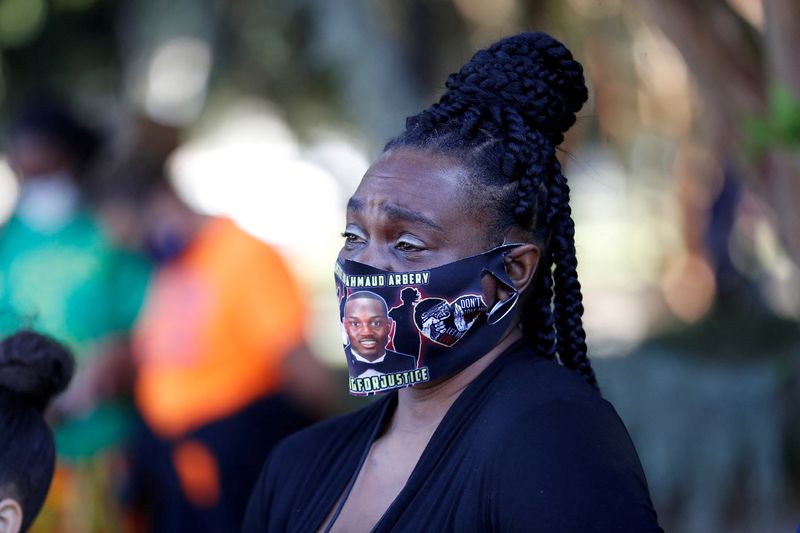By Rich McKay
BRUNSWICK, Ga. (Reuters) - Carla Arbery has a T-shirt summing up what’s changed in her coastal Georgia community since the murder of nephew Ahmaud Arbery by three white men in 2020.
Phrases on her shirt list action sparked by the fatal shooting of the young Black jogger: The abolishment of a state citizens-arrest provision that the three white killers claimed justified the shooting. The removal and indictment of the local district attorney. And new leadership in the police department.
"His life did matter," said Carla Arbery, 52. "I don't want people to ever forget it. Or forget him."
As Black residents of Georgia say they will press for more change, the last major milestone in the Arbery case is set to play out on Monday. Travis McMichael, 36, his father, Gregory McMichael, 66, and a neighbor, William "Roddie" Bryan, 52, face sentencing for their February convictions for federal hate crimes and other charges in the Arbery killing. Each faces life in prison.
Last year the men were also convicted in state court of murder and other crimes and were sentenced to life in prison. They have appealed those convictions.
A 25-year-old onetime high school football star, Arbery worked for a truck-washing company and his father's landscaping business. He was shot on Feb. 23, 2020, while jogging in Satilla Shores, a subdivision outside Brunswick (NYSE:BC).
Mostly white Satilla Shores, just two miles from Arbery’s home, contrasts with the county seat of Brunswick – a city of 16,000 people, mostly minorities, and among the poorest in the state.
The McMichaels claimed they thought Arbery was a burglar and began pursuing him. Bryan joined in, telling police that he thought the jogger must be up to something if the McMichaels were chasing him.
The men cornered Arbery with their trucks before the younger McMichael fatally shot him. About two months later, Bryan's cell phone video of the attack went viral after being leaked by a defense lawyer.
Charges weren't issued until 73 days after the murder, when the Georgia Bureau of Investigation had taken over the case from local authorities. Charges had not been brought by the local district attorney at the time, Jackie Johnson, who is white–and for whom the elder McMichael had worked as an investigator after leaving the Glynn County police department.
NEW PROSECUTOR, NEW POLICE CHIEF
Arbery's family worked to get Johnson voted from office in November 2020. Johnson has since been indicted on charges of violating her oath of office and hindering law enforcement. She has denied the charges and filed a motion to dismiss them. Reuters was unable to reach her or her lawyer for comment.
After the Arbery case drew global attention, Georgia's citizen's arrest law was largely abolished by a law Gov. Brian Kemp signed last May. A few months later, Kemp signed a new hate crimes law. Glynn County fired its white police chief.
Glynn County Commissioner Allen Booker, who is a family friend of the Arberys, said the case was among the reasons the commission sacked the police chief in the county of 85,000. The department was rife with broader troubles, too, he said, including a culture of "good ol' boy" cronyism.
"Change is here," said Booker, the only Black member among the seven county commissioners.
The former chief, John Powell, has disputed claims of misconduct on the force during his watch and has denied charges of violating oaths of office brought against him in Glynn County Superior Court. His attorney was not available for comment.
The new chief is Jacques Battiste, a former special agent for the Federal Bureau of Investigation and onetime New Orleans police officer. He is the county's first Black police head. Battiste was unavailable for an interview, a county spokesperson said.
Three Georgia law enforcement officers have filed a suit against Glynn County and the members of the commission. The suit claims that the political environment following Arbery's death led the commission to overlook them for the job of chief in favor of hiring a Black officer.
Booker declined to comment on the suit, as did a spokesperson for the county commission. Last year, Booker was quoted in the Brunswick News as saying that to "choose somebody other than something the Black community would be comfortable with, I think it's the wrong way to go."
Protests over Arbery's death drew national civil rights activists to this region of scenic shorelines and old oaks draped with Spanish moss. The murder also prompted new local activism.
Rabbi Rachael Bregman, who is white, co-founded a group called Glynn Clergy of Equity. It has hosted dinners to bring together people of different races and faiths. "We've found a new willingness for people, white and not-white, Black, to have a conversation about racial equity, gender equity, all of it," she said.

Elijah "Bobby" Henderson, 46, a Black electrical engineer, co-founded a group called A Better Glynn. It promoted the successful candidate who ran against Johnson for district attorney. Henderson has pledged to help people restore their voting rights after criminal convictions. Some of those people were convicted on years-old traffic violations after being unable to pay their fines, he said.
"The big thing we need to change is the culture that helped the cover-up of Ahmaud's murder," Henderson said. "Black people are still disenfranchised."